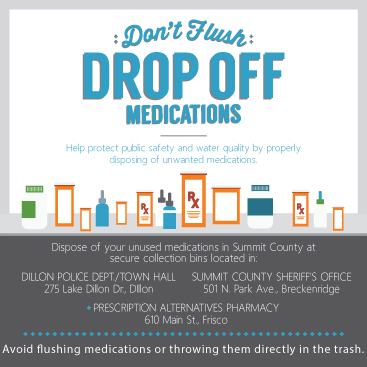Ask Eartha: Is Flushing Extra Painkillers Down the Toilet Bad for the Environment?
Dear Eartha,
After my recent ACL surgery, I have lots of extra painkillers left and don’t know what to do with them. My grandmother advised me to just flush my unused medications down the toilet, but I feel this might be bad for the environment. Is that the case?
Jennifer, Frisco
 Jennifer, you are absolutely correct in your assumption, and thank you for asking this all-important question. Flushing unused or unwanted medications down the toilet is definitely not the correct way to dispose of them. In fact, this practice can cause pollution of our waters, negatively impacting aquatic species and contaminating food and water supplies. This is why the High Country Conservation Center has created a safer alternative called the Pharmaceutical Take-Back Program that allows people to drop off their medications into designated bins at various spots throughout the county.
Jennifer, you are absolutely correct in your assumption, and thank you for asking this all-important question. Flushing unused or unwanted medications down the toilet is definitely not the correct way to dispose of them. In fact, this practice can cause pollution of our waters, negatively impacting aquatic species and contaminating food and water supplies. This is why the High Country Conservation Center has created a safer alternative called the Pharmaceutical Take-Back Program that allows people to drop off their medications into designated bins at various spots throughout the county.
But, before we get to the nitty gritty, let’s take a look at some statistics. Americans currently spend about $360 billion on prescription drugs every year. And by 2021, that number is expected to rise to as much as $610 billion. While we don’t know what percentage of these medications gets flushed down the toilet, a nationwide survey found low levels of pharmaceuticals in 80 percent of the waterways tested. How did they get there? When flushed down toilets, medicines pass through wastewater treatment plants (which are effective at removing many drugs, but not all) or septic systems and end up in rivers and lakes. These bodies of water may serve as resources for community drinking water supplies, which means you could get more than just water flowing out of the tap. The exposure to a combination of drugs in our water — even in small amounts such as parts per million or even parts per billion — ingested over decades could have serious health effects on humans. The potential danger comes from long-term chronic exposure as these medications accumulate in body tissue, building up over time until they reach a toxic level. And while we don’t know yet what effects — if any — these water-borne pharmaceuticals will have on human bodies, we do know what they do to fish and other aquatic creatures.
 Hormones in medications such as birth control have been shown to cause changes such as intersex development in amphibians and fish. Antidepressants have been found in the brain tissue of fish caught downstream from wastewater treatment plants. “You can have measurable behavioral effects in fish and shellfish even at the parts per billion level,” says Christian Daughton, a veteran EPA scientist who studies how pharmaceuticals affect waterways. “Some drugs apparently accumulate in fish over time: A study published in the journal Environmental Science found that male fish whose brains contained traces of Zoloft appeared less anxious. And while that might seem amusing, these fish are also less effective at seeking shelter from predators.”
Hormones in medications such as birth control have been shown to cause changes such as intersex development in amphibians and fish. Antidepressants have been found in the brain tissue of fish caught downstream from wastewater treatment plants. “You can have measurable behavioral effects in fish and shellfish even at the parts per billion level,” says Christian Daughton, a veteran EPA scientist who studies how pharmaceuticals affect waterways. “Some drugs apparently accumulate in fish over time: A study published in the journal Environmental Science found that male fish whose brains contained traces of Zoloft appeared less anxious. And while that might seem amusing, these fish are also less effective at seeking shelter from predators.”
So, with all this in mind, Jennifer, why would anyone want to flush their unused and unwanted medications? Fortunately, we have access to convenient and water-friendly pharmaceutical disposal right here in Summit County, thanks to a partnership with the Summit County Sheriff’s Department, Colorado Department of Public Health and Environment and the Summit County Water Quality Committee. So don’t flush your unused prescription drugs down the toilet. Instead, visit the High Country Conservation Center’s website for more information about the Pharmaceutical Take-Back Program. There you’ll find a list of which drugs are accepted and where you can drop them off. Take-back spots are strategically located at the Summit County Justice Center in Breckenridge, Dillon Police Department and Prescription Alternatives in Frisco. By not flushing you keep both your human and aquatic neighbors safe, so thanks!
Ask Eartha Steward is written by the staff at the High Country Conservation Center, a nonprofit organization dedicated to waste reduction and resource conservation. Submit questions to Eartha at eartha@staging.highcountryconservation.org.




